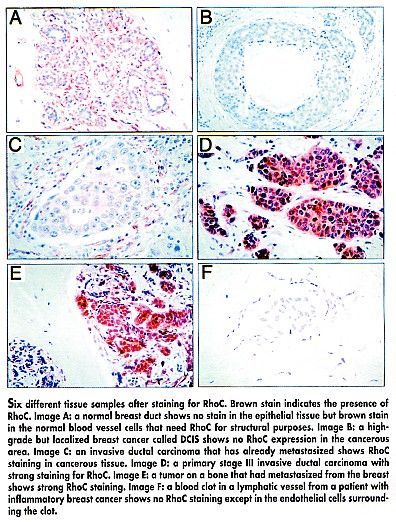RhoC May Be a Marker for Small, Aggressive Breast Cancers
SAN FRANCISCO-Complete axillary lymph node dissection followed by chemotherapy is standard treatment for larger breast tumors, but it is less frequently performed when the tumor is smaller than 1 cm. Still, approximately 5% to 8% of these small breast tumors are very aggressive. Currently, there is no way to identify which of these small tumors are more likely to metastasize and thus should receive more appropriate treatment.
SAN FRANCISCOComplete axillary lymph node dissection followed by chemotherapy is standard treatment for larger breast tumors, but it is less frequently performed when the tumor is smaller than 1 cm. Still, approximately 5% to 8% of these small breast tumors are very aggressive. Currently, there is no way to identify which of these small tumors are more likely to metastasize and thus should receive more appropriate treatment.
Now, early research presented at the 93rd Annual Meeting of the American Association for Cancer Research (abstract 3548) indicates that the protein RhoC-GTPase (RhoC) may be a marker for these small, aggressive breast cancers. Other studies have previously indicated that RhoC, which is involved in cell polarity and motility, may be overexpressed in cancers of the breast, pancreas, and skin.
Building on their previous studies of the usefulness of RhoC as a marker for inflammatory breast cancer, the University of Michigan researchers developed a specific polyclonal anti-RhoC antibody test that they then used on 182 breast tissue samples from 164 patients, obtained from the University of Michigan’s breast cancer library. Vascular smooth muscle cells were used as internal positive controls.
Staining intensity following immunohistochemistry on formalin-fixed tissues was rated from 0 to 3, with a rating of 0-1 considered negative and a rating of 2-3 positive.

RhoC was expressed in 32% of the invasive carcinomas, but in none of the normal breast, fibrocystic breast, atypical hyperplasia, or ductal carcinoma in situ samples, said Celina Kleer, MD, assistant professor of pathology, University of Michigan Medical School, Ann Arbor. Specificity for tumors with metastatic potential was 88%, and it was 92% for invasive tumors smaller than 1 cm that had metastasized.
Dr. Kleer noted that RhoC expression was associated with negative progesterone receptors and HER-2/neu overexpression, two other markers associated with a poor prognosis.
Clinical Test for RhoC a Possibility
"If our studies are confirmed and RhoC is proved to be a good marker for these small but aggressive invasive tumors, it would be highly desirable to develop a test," Dr. Kleer said. "But first we have to confirm that this is the case and then develop a clinical test that could be applied to the management of patients with breast cancer."
Dr. Kleer and her coworkers will be continuing their investigation of RhoC in breast cancer samples and hope soon to start clinical studies examining the usefulness of RhoC as a marker for more aggressive breast tumors.